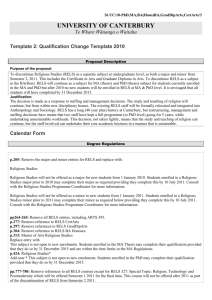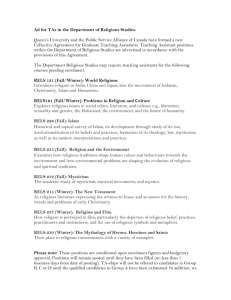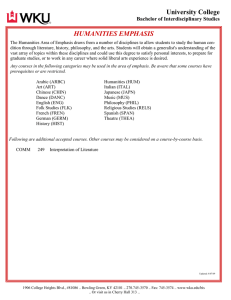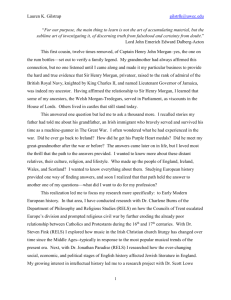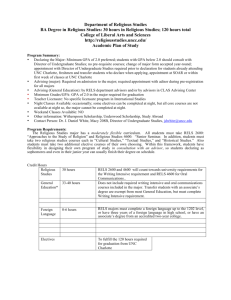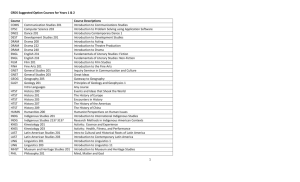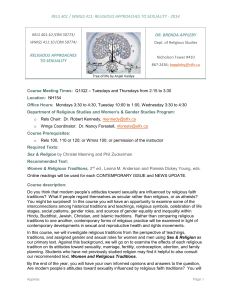Undergraduate Curriculum Committee Date: 31 January 2011 From:
advertisement
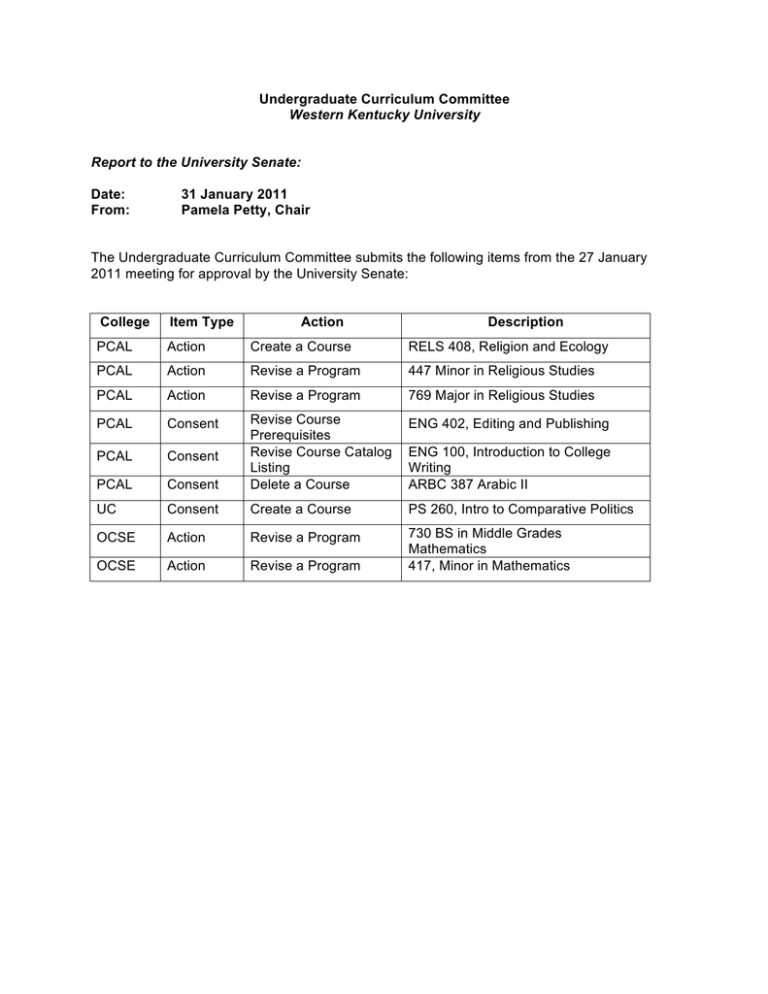
Undergraduate Curriculum Committee Western Kentucky University Report to the University Senate: Date: From: 31 January 2011 Pamela Petty, Chair The Undergraduate Curriculum Committee submits the following items from the 27 January 2011 meeting for approval by the University Senate: College Item Type Action Description PCAL Action Create a Course RELS 408, Religion and Ecology PCAL Action Revise a Program 447 Minor in Religious Studies PCAL Action Revise a Program 769 Major in Religious Studies PCAL Consent ENG 402, Editing and Publishing PCAL Consent PCAL Consent Revise Course Prerequisites Revise Course Catalog Listing Delete a Course UC Consent Create a Course PS 260, Intro to Comparative Politics OCSE Action Revise a Program OCSE Action Revise a Program 730 BS in Middle Grades Mathematics 417, Minor in Mathematics ENG 100, Introduction to College Writing ARBC 387 Arabic II Potter College of Arts & Letters Western Kentucky University 745-2345 REPORT TO THE UNIVERSITY CURRICULUM COMMITTEE Date: January 27, 2011 The Potter College of Arts & Letters submits the following items for consideration: Type of Item Description of Item & Contact Information Action Action Action Proposal to Create a New Course RELS 408 Religion and Ecology Contact: Isabel Mukonyora, bella.mukonyora@wku.edu, 745-5754 Proposal to Revise a Program 447 Minor in Religious Studies Contact: Eric Bain-Selbo, eric.bain-selbo@wku.edu, 745-5744 Proposal to Revise a Program 769 Major in Religious Studies Contact: Eric Bain-Selbo, eric.bain-selbo@wku.edu, 745-5744 Proposal Date: September 1, 2010 Potter College of Arts and Letters Department of Philosophy and Religion Proposal to Create a New Course (Action Item) Contact Persons: Eric Bain-Selbo, eric.bain-selbo@wku.edu, x55744 and Isabel Mukonyora, bella.mukonyora@wku.edu, x55745 1. Identification of proposed course: 1.1 Course prefix (subject area) and number: RELS 408 1.2 Course title: Religion and Ecology 1.3 Abbreviated course title: RELIGION AND ECOLOGY 1.4 Credit hours and contact hours: 3 1.5 Type of course: Seminar 1.6 Prerequisites/corequisites: One course in Religious Studies or permission of instructor. 1.7 Course catalog listing: The study of different religious perspectives on ecology. 2. Rationale: 2.1 This course proposal is a response to an international trend whereby universities are developing courses aimed at helping students understand the role of religion in shaping attitudes to the environment. With lessons on ecology selected from disciplines such as philosophy, history, and science, this course will help students develop analytical skills for examining theories relating religion to facts about the destruction of the environment, climate change and related problems. 3. 2.2 Projected enrollment in the proposed course: 20, based on enrollment numbers in other courses taught in the department at this level and the enrollment in the course when offered as a special topics course. 2.3 Relationship of the proposed course to courses now offered by the department: This course will make students aware of what different religions say about life and its destruction on Earth. It builds upon the scholarly critiques of different religions, philosophy and science that come from content areas taught in a number of department courses, particularly the “traditions” courses at the 300 level. 2.4 Relationship of the proposed course to courses offered in other departments: This course will contribute to the Minor in Environmental Studies and WKU’s curricular internationalism. Here are examples of courses that address related topics: Geog 444 Environmental Ethics in Geography; Geog 455 Global Environmental Change; ENV 360 Air Pollution Control; Hist 479 Topics in World History; Folk 340 Peoples and Cultures of Latin America, Folk/AFAM 350 Peoples and Cultures of Africa; and Anth 440 Anthropology of Religion. The proposed course will be distinguished by the focus on religion. 2.5 Relationship of the proposed course to courses offered in other institutions: This course follows the example of ENVST 307 Yale University’s Forestry and Religious Studies; RELS 389 Tufts University’s Religion and Ecology, RELS 311 University of Toronto’s World Religions and Ecology; RELS 339 University of Florida’s Spiritual Ecology; RELS 296 University of Vermont Religion and Ecology. The American Academy of Religions’ International Forum of Religion and Ecology is involved in getting its members to develop similar courses in as many universities around the world as possible. Discussion of proposed course: 3.1 Students will • • • • 3.2 3.3 examine scholarly perspectives of world religions as they pertain to the environment and related issues; reflect on religious worldviews that shape attitudes to the environment; engage in dialogue with different religious viewpoints relevant to understanding topical debates on climate change; link theoretical to experiential modes of learning. Content outline: The course will examine • the growing number of theories and facts concerning the destruction of the environment; • modern critiques of religion and science concerned with the preservation of life on planet earth; • different religious ideas used by scholars to advance learning about the meaning of life on earth; Student expectations and requirements: Students will have regular assignments to help them cover a variety of religious texts on religion and the environment. They will also be required to take part in student-led seminar classes, and to write research papers. 3.4 Tentative texts and course materials: Readings will be selected from the following books:Albanese, Catherine. Nature Religions in America: From the Algonkian Indians to the New Age. Chicago: University of Chicago Press, 1990. Apffel-Marglin, F. & Marglin, Stephen A. (eds.) Decolonizing Knowledge: From Development to Dialogue. Oxford: Clarendon Press, 1996. Ba Kader, Abou Bakr Ahmed. Environmental Protection in Islam. Washington, DC. Island Press, 1995. Ball, Ian et.al. The Earth Beneath: A Critical Guide to Green Theology. London: SPCK, 1995. Barnhill, David and Roger Gottlieb, (eds.) Deep Ecology and World Religions: New Essays on Sacred Ground. Albany, NY: SUNY, 2001. Berry Wendell, (ed). Sex, Economy, Freedom, and Community. New York: Pantheon, 1993. Boff, Leonardo. Cry of the Earth, Cry of the Poor. Maryknoll, New York: Orbis, 1997. Buun, Ole and Arne Kalland (eds.) Asian Perceptions of Nature: A Critical Approach. Richmond Surrey: Nordic Institute of Asian Studies, 1995. Chapple, Christopher Key & Tucker, Mary Evelyn, eds. Hinduism and Ecology: The Intersection of Earth, Sky and Water. Cambridge Mass: Harvard University Press, 2000 Cobb, John B. Sustainability: Economics, Ecology and Justice. Maryknoll, NY: Orbis, 1992. Dale, Jamieson (Ed). A Companion to Environmental Philosophy. London: Blackwell, 2001. Goodenough, Ursula. The Sacred Depths of Nature. New York: Oxford University Press, 1998. Gottlieb, Roger, S. (ed). The Oxford Handbook of Religion and Ecology. New York: Oxford University Press, 2006. Kearns, Laurel & Keller, Catherine (Eds). Ecospirit: Religions and Philosophies for the Earth. New York: Fordham University Press 2007 Linzey, Andrew. Animal Theology. Urbana, III: University of Illinois Press, 1995. McFague, Sallie. Life Abundant: Rethinking Theology and Economy for a Planet in Peril. Minneapolis, MN: Fortress Press, 2001. _____. Models of God: Theology for an Ecological, Nuclear Age. Philadelphia: Fortress, 1987. McGrath, Alister. The Reenchantment of Nature: The Denial of Religion and the Ecological Crisis. New York NY: Doubleday, 2002. McKibben, Bill. The Comforting Whirlwind: God, Job and the Scale of Creation. Grand Rapids Michigan: Eerdmans, 1994. Primavesi, Anne. Gaia and Climate Change: A Theology of Gift Events. London and New York: Routledge, Taylor & Francis Group, 2009. Radford-Reuther, Rosemary. Gaia and God: An Ecofeminist Theology of Earth Healing. San Francisco: Harper, 1992. _____. Integrating Ecofeminisim, Globalization and World Religion. Lanham, MD: Rowman and Littlefield, 2005. _____. (Ed). Women Healing Earth: Third World Women on Ecology, Feminism and Religion. Maryknoll NY: Orbis, 1996. Russell, Colin. The Earth, Humanity and God: The Templeton Lectures, Cambridge. London: UCL Press, 1994. Southwick, Charles H. Global Ecology in Human Perspective. New York: Oxford University Press, 1996. Taylor, Bron Raymond. Ecological Movements: The Global Emergence of Radical and Popular Environmentalism. Albany NY: State University of New York Press, 1995. Tucker, Evelyn. Worldly Wonder: Religions Enter Their Ecological Phase. Chicago, IL: Open Court, 2003. _____ & Grim, John A (Eds). Worldviews and Ecology: Religion, Philosophy and the Environment. Maryknoll, New York: Orbis Books, 1994. Wallace, Mark. Christianity and Ecology eds., Dieter T. Hessel and Rosemary Radford-Reuther, Cambridge Mass: Harvard Press, 2000. 4. Resources: 4.1 Library resources: Sufficient. 4.2 Computer resources: Sufficient. 5. Budget implications: 5.1 Proposed method of staffing: Current, full-time faculty. 5.2 Special equipment needed: N/A 5.3 Expendable materials needed: N/A 5.4 Laboratory materials needed: N/A 6. Proposed term for implementation: 201210 7. Dates of prior committee approvals: Religious Studies Program: September 15, 2010 Department of Philosophy and Religion: September 22, 2010 Potter College Curriculum Committee December 2, 2010 Undergraduate Curriculum Committee ___________________ University Senate ___________________ Attachment: Bibliography, Library Resources Form, Course Inventory Form Proposal Date: August 15, 2008 Potter College of Arts & Letters Department of Philosophy and Religion Proposal to Revise A Program (Action Item) Contact Person: Eric Bain-Selbo, eric.bain-selbo@wku.edu, 745-5744 1. Identification of program: 1.1 Current program reference number: 447 1.2 Current program title: Minor in Religious Studies 1.3 Credit hours: 21 2. Identification of the proposed program changes: There are four changes being proposed: 1) dividing the “Traditions” requirement into two categories, with students being required to take at least one course from each category; 2) adding courses outside the program to serve as “Electives” for the minor (though requiring that at least 6 hours of electives be in RELS courses); 3) adding RELS 311 to the “Religious Texts” category; 4) deleting the wording in the elective category that pertains to the study of languages. 3. Detailed program description: Current Program The minor in religious studies (reference number 447) requires a minimum of 21 hours. At least 12 hours must be taken in courses numbered 300 or above. I. Religious Texts (3 hours) RELS 100: The New Testament OR RELS 101: The Old Testament/Hebrew Scriptures OR RELS 300: The Life of Jesus OR RELS 301: Life and Teaching of Paul II. Traditions (9 hours) RELS 302: Buddhist Religious Traditions RELS 303: Hindu Religious Traditions RELS 304: Judaic Religious Traditions RELS 305: Christian Religious Traditions RELS 306: Islamic Religious Traditions RELS 307: Native American Religious Traditions RELS 308: East Asian Religious Traditions III. Electives (9 hours) Electives may be selected from among the total offerings in RELS, including additional courses in III and up to 6 hours of departmentally-approved language courses and up to 3 hours of departmentally-approved study abroad courses. Proposed Program The minor in religious studies (reference number 447) requires a minimum of 21 hours. At least 12 hours must be taken in courses numbered 300 or above. I. Religious Texts (3 hours) RELS 100: The New Testament OR RELS 101: The Old Testament/Hebrew Scriptures OR RELS 300: The Life of Jesus OR RELS 301: Life and Teaching of Paul OR RELS 311: The Qur’an II. Traditions (9 hours; at least one course from each category) Category A RELS 302: Buddhist Religious Traditions RELS 303: Hindu Religious Traditions RELS 307: Native American Religious Traditions RELS 308: East Asian Religious Traditions Category B RELS 304: Judaic Religious Traditions RELS 305: Christian Religious Traditions RELS 306: Islamic Religious Traditions III. Electives (9 hours; at least 6 hours must be in RELS courses) Electives may be selected from among the total offerings in RELS. Electives also may be selected from the following pre-approved list (or other courses approved by the Department Head) as well as from departmentally-approved language and study abroad courses. ANTH 446: Anthropology of Religion ART 316: Medieval Art and Architecture ART 407: Islamic Art and Architecture ENG 396: Mythology ENG 487: Dante HIST 318: Age of the Reformation HIST 407: The Crusades: West Meets East PHIL 310: Science, Religion and Contemporary Life PHIL 329: Concepts of God, Good and Evil PHIL 341: Reason and the Divine in Hellenism and Late Antiquity PHIL 342: Renaissance and Renewal in the Middle Ages PSY 485: Psychology of Religion SOCL 322: Religion in Society 4. Rationale for the proposed program change: 1) There has been a concern in the program that students could complete the requirements for the minor without substantively engaging religions outside the Abrahamic traditions. The proposed change to the “Traditions” category alleviates that concern by requiring students to study at least one tradition or set of traditions outside the Abrahamic traditions. 2) In many ways, religious studies is intrinsically an interdisciplinary field of study. The change to our “Electives” category reflects this fact, allowing students to use courses from across the campus to complete their program. 3) RELS 311 was developed during the last academic year. The faculty in the Religious Studies program has determined that it can help students develop the skills of textual analysis that are the goal of the “Religious Texts” category of the Religious Studies curriculum. Thus, we propose that the course be included as an option in that category. 4) The wording about the study of language is a carry over from years ago. We do not want to discourage appropriate language work offered by the department, so we want to eliminate the restriction to six hours. 5. Proposed term for implementation and special provisions (if applicable): 201130 6. Dates of prior committee approvals: Religious Studies Program: September 1, 2010 Department of Philosophy and Religion September 22, 2010 Potter College Curriculum Committee December 2, 2010 Undergraduate Curriculum Committee ___________________ University Senate ___________________ Attachment: Program Inventory Form Proposal Date: August 15, 2010 Potter College of Arts & Letters Department of Philosophy and Religion Proposal to Revise A Program (Action Item) Contact Person: Eric Bain-Selbo, eric.bain-selbo@wku.edu, 745-5744 1. Identification of program: 1.1 Current program reference number: 769 1.2 Current program title: Major in Religious Studies 1.3 Credit hours: 30 2. Identification of the proposed program changes: There are four changes being proposed: 1) dividing the “Traditions” requirement into two categories, with students being required to take at least one course from each category; 2) adding courses outside the program to serve as “Electives” for the major (though requiring that at least 9 hours of electives be in RELS courses); 3) adding RELS 311 to the “Religious Texts” category; 4) deleting the wording in the elective category that pertains to the study of languages. 3. Detailed program description: Current Program The major in religious studies (reference number 769) requires a minimum of 30 semester hours and leads to a Bachelor of Arts degree. At least 15 hours must be in courses numbered 300 or above, with at least 6 hours at the 400-level. A minor or second major is required. I. Religious Texts (3 hours) RELS 100: The New Testament OR RELS 101: The Old Testament/Hebrew Scriptures OR RELS 300: The Life of Jesus OR RELS 301: Life and Teaching of Paul II. Traditions (9 hours) RELS 302: Buddhist Religious Traditions RELS 303: Hindu Religious Traditions RELS 304: Judaic Religious Traditions RELS 305: Christian Religious Traditions RELS 306: Islamic Religious Traditions RELS 307: Native American Religious Traditions RELS 308: East Asian Religious Traditions III. Senior Seminar (3 hours) RELS 496 IV. Electives (15 hours) Electives may be selected from among the total offerings in RELS, including additional courses in I-II and up to 6 hours of departmentally-approved language courses and up to 6 hours of departmentallyapproved study abroad courses. Proposed Program The major in religious studies (reference number 769) requires a minimum of 30 semester hours and leads to a Bachelor of Arts degree. At least 15 hours must be in courses numbered 300 or above, with at least 6 hours at the 400-level. A minor or second major is required. I. Religious Texts (3 hours) RELS 100: The New Testament OR RELS 101: The Old Testament/Hebrew Scriptures OR RELS 300: The Life of Jesus OR RELS 301: Life and Teaching of Paul OR RELS 311: The Qur’an II. Traditions (9 hours; at least one course from each category) Category A RELS 302: Buddhist Religious Traditions RELS 303: Hindu Religious Traditions RELS 307: Native American Religious Traditions RELS 308: East Asian Religious Traditions Category B RELS 304: Judaic Religious Traditions RELS 305: Christian Religious Traditions RELS 306: Islamic Religious Traditions III. Senior Seminar (3 hours) RELS 496 IV. Electives (15 hours; at least 9 hours must be in RELS courses) Electives may be selected from among the total offerings in RELS. Electives also may be selected from the following pre-approved list (or other courses approved by the Department Head) as well as from departmentally-approved language and study abroad courses. ANTH 446: Anthropology of Religion ART 316: Medieval Art and Architecture ART 407: Islamic Art and Architecture ENG 396: Mythology ENG 487: Dante HIST 318: Age of the Reformation HIST 407: The Crusades: West Meets East PHIL 310: Science, Religion and Contemporary Life PHIL 329: Concepts of God, Good and Evil PHIL 341: Reason and the Divine in Hellenism and Late Antiquity PHIL 342: Renaissance and Renewal in the Middle Ages PSY 485: Psychology of Religion SOCL 322: Religion in Society 4. Rationale for the proposed program change: 1) There has been a concern in the program that students could complete the requirements for the major without substantively engaging religions outside the Abrahamic traditions. The proposed change to the “Traditions” category alleviates that concern by requiring students to study at least one tradition or set of traditions outside the Abrahamic traditions. 2) In many ways, religious studies is intrinsically an interdisciplinary field of study. The change to our “Electives” category reflects this fact, allowing students to use courses from across the campus to complete their program. 3) RELS 311 was developed during the last academic year. The faculty in the Religious Studies program has determined that it can help students develop the skills of textual analysis that are the goal of the “Religious Texts” category of the Religious Studies curriculum. Thus, we propose that the course be included as an option in that category. 4) The wording about the study of language is a carry over from years ago. We do not want to discourage appropriate language work offered by the department, so we want to eliminate the restriction to six hours. 5. Proposed term for implementation and special provisions (if applicable): 201130 6. Dates of prior committee approvals: Religious Studies Program September 1, 2010 Department of Philosophy and Religion September 22, 2010 Potter College Curriculum Committee December 2, 2010 Undergraduate Curriculum Committee ___________________ University Senate ___________________ Attachment: Program Inventory Form Potter College of Arts & Letters Western Kentucky University 745-2345 REPORT TO THE UNIVERSITY CURRICULUM COMMITTEE Date: January 27, 2011 The Potter College of Arts & Letters submits the following items for consideration: Type of Item Description of Item & Contact Information Consent Consent Consent Proposal to Revise Course Prerequisites/Corequisites ENG 402 Editing and Publishing Contact: Karen Schneider, karen.schneider@wku.edu, 745-3046 Proposal to Revise Course Catalog Listing ENG 100 Introduction to College Writing Contact: Christopher Ervin, christopher.ervin@wku.edu, 745-4650 Proposal to Delete a Course ARBC 387 Arabic II Contact: Laura McGee, laura.mcgee@wku.edu, 745-2401 Proposal Date: 5 November 2010 Potter College of Arts and Letters Department of English Proposal to Revise Course Prerequisites/Corequisites (Consent Item) Contact Person: karen.schneider@wku.edu 5-3046 1. Identification of course: 1.8 Course prefix (subject area) and number: ENG 402 1.9 Course title: Editing and Publishing 1.10 Credit hours: 3 2. Current prerequisites requirements: 9 hours of writing beyond General Education courses 3. Proposed prerequisites requirements: either ENG 306 or ENG 307 and one additional upper-level professional writing class 4. Rationale for the revision of prerequisites requirements: Because we offer ENG 402 only once every four semesters, students needing the course often cannot take three professional writing courses in time to take ENG 402 before they graduate. Their timing has to be just right. The professional writing committee has agreed that the new prerequisites will suffice. This revision will allow more students to take the course. 5. Effect on completion of major/minor sequence: This change will improve the chances of completing the PW sequence in a timely manner. 6. Proposed term for implementation: 201130 7. Dates of prior committee approvals: English Department/Division: _11/10/10__________ PCAL Curriculum Committee _12/2/10___________ Undergraduate Curriculum Committee ___________________ University Senate ___________________ Attachment: Course Inventory Form Proposal Date: 20 November 2010 Potter College of Arts and Letters Department of English Proposal to Revise Course Catalog Listing (Consent Item) Contact Person: Christopher.ervin@wku.edu 5-4650 1. Identification of course: 1.11 Course prefix (subject area) and number: ENG 100 1.12 Course title: Introduction to College Writing 1.13 Credit hours: 3 2. Current course catalog listing: Prerequisite: Minimum score of 16 on English section of ACT or successful completion of 055 with a grade of “C” or better. Students with ACT English scores of 16 and 17 will be required to attend ENG 100E sections which include an extra hour of class time. Emphasizes writing for a variety of rhetorical situations with attention to voice, audience and purpose. Provides practice in development, organization, revision and editing. Introduces research skills. [GEN ED A-I]” 3. Proposed course catalog listing: Prerequisite: Minimum score of 16 on English section of ACT or successful completion of 055 with a grade of “C” or better. Students with ACT English scores of 16 and 17 will be required to attend ENG 100E sections which include an extra hour of class time. Students who have unsuccessfully attempted English 100 (earned grade of W, F, or FN) may not retake English 100 as a WEB section except under extraordinary circumstances, and then only with the written permission of the Director of Composition. Emphasizes writing for a variety of rhetorical situations with attention to voice, audience and purpose. Provides practice in development, organization, revision and editing. Introduces research skills. [GEN ED A-I]” 4. Rationale for revision of the course catalog listing: A departmental assessment of WEB sections of English 100 (Fall 2008-Summer 2010) showed that students who enroll in a WEB section of English 100 after one or more prior unsuccessful attempts at English 100 are far more likely to fail the repeat attempt (in the WEB section) compared to students whose repeat attempt is in a face to face class (32% repeat failures in WEB sections compared to 7% in face to face classes). Students who are unsuccessful in English 100 the first time, then, are much less likely to succeed in the online learning environment that requires them to work independently and to set and keep deadlines without regular face-to-face meetings with an instructor. 5. Proposed term for implementation: 201130 6. Dates of prior committee approvals: English Department/Division: __11/17/10__________ PCAL Curriculum Committee __12/02/10_________ General Education Committee (if applicable) __________________ Undergraduate Curriculum Committee ___________________ University Senate ___________________ Attachment: Course Inventory Form Proposal Date: November 3, 2010 Potter College of Arts and Letters Department of Modern Languages Proposal to Delete a Course (Consent Item) Contact Person: Laura McGee, 745-2401, laura.mcgee@wku.edu 1. Identification of course: 1.1 Current course prefix (subject area) and number: ARBC 387 1.2 Course title: Arabic II 1.3 Credit hours: 3 2. Rationale for the course deletion: Arabic instruction is now offered through the Department of Modern Languages. ARBC 387 course had been cross-listed with RELS 387 but that course has been dropped from the Department of Philosophy and Religion’s offerings. Second semester Arabic is now taught as ARBC 102, in a numbering system consistent with other language offerings. 3. Effect of course deletion on programs or other departments, if known: None 4. Proposed term for implementation: 201130 5. Dates of prior committee approvals: Department of Modern Languages: November 16, 2010 Potter College Curriculum Committee January 10, 2011 General Education Committee (if applicable) __________________ Undergraduate Curriculum Committee ___________________ University Senate ___________________ Attachment: Course Inventory Form UNIVERSITY COLLEGE University Curriculum Committee Contact: Nevil Speer DATE: December 13, 2010 Type of Item Description of Item Consent Proposal to Create a University College Commonwealth School Equivalent Course Item: PS 260 Intro to Comparative Politics Contact: Deborah Weisberger deborah.weisberger@wku.edu Phone: 780-2540 Proposal Date: November 8, 2010 University College Liberal Arts and Sciences Proposal to Create a University College Commonwealth School Equivalent Course (Consent Item) Contact Person: Deborah Weisberger, deborah.weisberger@wku.edu, 780-2540 1. Identification of course: 1.14 Current course prefix (subject area) and number: PS 260 1.15 Course title: Intro to Comparative Politics 1.16 Credit hours: 3 2. Identification of proposed Commonwealth School course: 2.1 Commonwealth School number: POLS 260C 2.2 Community College title: Intro to Comparative Politics 2.3 Credit hours: 3 3. Proposed term for implementation: Fall 2011 4. Dates of prior committee approvals: Liberal Arts and Science Division: _November 8, 2010 University College Curriculum Committee December 13, 2010 Undergraduate Curriculum Committee University Senate Attachment: Course Inventory Form ___________________ ___________________ Ogden College of Science and Engineering Office of the Dean 745-4449 REPORT TO THE UNIVERSITY CURRICULUM COMMITTEE Date: January 13, 2011 The Ogden College of Science and Engineering submits the following items for consideration: I. New Business Type of item Description of Item & Contact Information Action Revise a Program Ref. #730, Bachelor of Science in Middle Grades Mathematics Contact: David K. Neal, david.neal@wku.edu, x56213 Action Revise a Program Ref. #417, Minor in Mathematics Contact: Wanda Weidemann, wanda.weidemann@wku.edu, x56211 Proposal Date: September 10, 2010 Ogden College of Science and Engineering Department of Mathematics and Computer Science Proposal to Revise A Program (Action Item) Contact Person: David K. Neal, david.neal@wku.edu, 745-6213 1. Identification of program: 1.17 Current program reference number: 730 1.18 Current program title: Bachelor of Science in Middle Grades Mathematics 1.19 Credit hours: 32 to 33 2. Identification of the proposed program changes: Establish admission requirements. 3. Detailed program description: Current Admission Requirements None Proposed Admission Requirements Students who wish to declare a 730 Middle Grades Mathematics major will initially be designated as “seeking admission” until the following requirements have been satisfied: • Complete MATH 117 and MATH 136, or MATH 136 and MATH 137; and MATH 205, with a grade of C or better in each course. • Have an overall GPA of at least 2.4 in all middle grades mathematics program courses (MATH 117 and above) completed prior to admission. (If a course is repeated, then the second grade is used to compute the GPA. If a course is repeated multiple times, then the average of all grades after the first attempt is used to compute the GPA.) 4. Rationale for the proposed program change: The proposed course completion requirements will improve the retention rate of middle grades mathematics majors and ensure that all students entering the program are qualified and capable of succeeding in the program. The grade and GPA requirements will create a uniform admission standard for all students in the middle grades and secondary mathematics certifiable majors. 5. Proposed term for implementation and special provisions: The proposed admission requirements will apply to students seeking admission to WKU for Fall 2011 and thereafter. Upon approval, the admission requirements will apply to all current students who seek to switch majors to middle grades mathematics. The requirements will not be retroactive to students who are already declared as middle grades mathematics majors. 6. Dates of prior committee approvals: Department of Mathematics and CS September 10, 2010 Ogden Curriculum Committee October 14, 2010 Professional Education Council November 10, 2010 Undergraduate Curriculum Committee University Senate Attachment: Program Inventory Form Proposal Date: November 12, 2009 Ogden College of Science and Technology Department of Mathematics and Computer Science Proposal to Revise A Program (Action Item) Contact Person: Wanda Weidemann, wanda.weidemann@wku.edu, 745-6211 1. Identification of program: 1.1 Current program reference number: 417 1.2 Current program title: Minor in Mathematics 1.3 Credit hours: minimum of 18 hours 2. Identification of the proposed program changes: • Delete “Minor Certifiable for Teaching Secondary Mathematics” • Modify course numbers, titles and credit hours to reflect previously approved changes: MATH 126 Calculus and Analytic Geometry I (4.5 hours) to MATH 136 Calculus I (4 hours); MATH 227 Calculus and Analytic Geometry II (4.5 hours) to MATH 137 Calculus II (4 hours); MATH 327 Multivariable Calculus (4 hours) to MATH 237 Multivariable Calculus (4 hours); and MATH 329 Probability and Statistics I to MATH 382 Probability and Statistics I (3 hours). • Delete MATH 122, 132, 232 as options for the calculus sequence • Change the number of 300/400-level courses required to compensate for the reduction in hours for the calculus sequence. 3. Detailed program description: Minor in Mathematics A minor in mathematics (reference number 417) requires a minimum of 18/21 semester hours. The program offers two options: (1) Minor for Employment in Industry and/or Graduate Studies in Mathematics. (2) Minor Certifiable for Teaching Secondary Level Mathematics. The student who elects a minor in mathematics (either option) must complete the following courses: the sequence MATH 126, 227 or the sequence MATH 122, 132, 232; and MATH 307. Option 1: Minor for Employment in Industry The student who elects a minor in mathematics but does not plan to teach is provided a Minor in Mathematics A minor in mathematics (reference number 417) requires a minimum of 18/21 semester hours. The program offers two options: (1) Minor for Employment in Industry and/or Graduate Studies in Mathematics. (2) Minor Certifiable for Teaching Secondary Level Mathematics. The student who elects a minor in mathematics (either option) must complete the following courses: the sequence MATH 126, 227 or the sequence MATH 122, 132, 232; the foundational sequence consisting of MATH 136, 137and 307*. Option 1: Minor for Employment in Industry The student who elects a minor in noncertifiable minor that requires at least eighteen semester hours of mathematics. In addition to the foundational sequence (MATH 126, 227, 307*) this student is required to select two courses from MATH 305, 310, 317, 327, 329, 331, or STAT 301**. * Students majoring in engineering may replace MATH 307with MATH 350. ** Students may not count both MATH 329 and STAT 301 in the minor. Option 2: Minor Certifiable for Teaching Secondary Mathematics The student who elects a minor in mathematics certifiable for secondary education is required to complete at least twenty-one semester hours of mathematics. In addition to the foundational sequence (MATH 126, 227, 307) this student is required to complete the following: 1. Both MATH 310 and MATH 323 2. One course chosen from MATH 305, 315, 317, 327, 329, 331, 409, or 423. The undergraduate student minoring in mathematics and planning to pursue a master’s degree with either a major or minor in mathematics is advised to include both MATH 317 and 327 in the undergraduate program. 4. • • • mathematics but does not plan to teach is provided a noncertifiable minor that requires at least eighteen semester hours of mathematics. In addition to the foundational sequence (MATH 126, 227, 307*) this the student is required to select a minimum of two three courses from MATH 237, 305, 310, 315, 317, 323, 327, 331, 337, 382, 398, 405, 406, 409, 415, 417, 423, 431, 432, 435, 439, 450, 470, 482, or STAT 301***. * Students majoring in engineering may replace MATH 307 with MATH 350. ** At least half of the hours that count towards the minor must be at the 300 level or above. In addition, students may not count both MATH 382 and STAT 301 in the minor. Option 2: Minor Certifiable for Teaching Secondary Mathematics The student who elects a minor in mathematics certifiable for secondary education is required to complete at least twenty-one semester hours of mathematics. In addition to the foundational sequence (MATH 126, 227, 307) this student is required to complete the following: 1. Both MATH 310 and MATH 323 2. One course chosen from MATH 305, 315, 317, 327, 329, 331, 409, or 423. The undergraduate student minoring in mathematics and planning to pursue a master’s degree with either a major or minor in mathematics is advised to include both MATH 317 and 327 in the undergraduate program. Rationale for the proposed program changes: The Kentucky Education Professional Standards Board (the agency that grants teacher certification in Kentucky) will no longer certify content minors. The revisions in course numbers, titles and credit hours reflect previously approved curriculum changes. The MATH 122, 132, 232 option for the calculus sequence has been removed because MATH 132 and 232 are being deleted from the WKU Course Inventory. • The reduction in the number of credit hours in the new calculus sequence necessitates that students enroll in one more 300/400-level course to satisfy the university’s minimum hours requirement for the minor. 5. Proposed term for implementation and special provisions (if applicable): Fall, 2011 (Note: the Kentucky Education Professional Standards Board will not certify mathematics minors who have not completed their undergraduate programs by January 2012.) 6. Dates of prior committee approvals: Dept. of Mathematics & Computer Science: _November 20, 2009_ Ogden College Curriculum Committee _October 14, 2010___ Professional Education Council _November 10, 2010_ Undergraduate Curriculum Committee ___________________ University Senate ___________________ Attachment: Program Inventory Form
